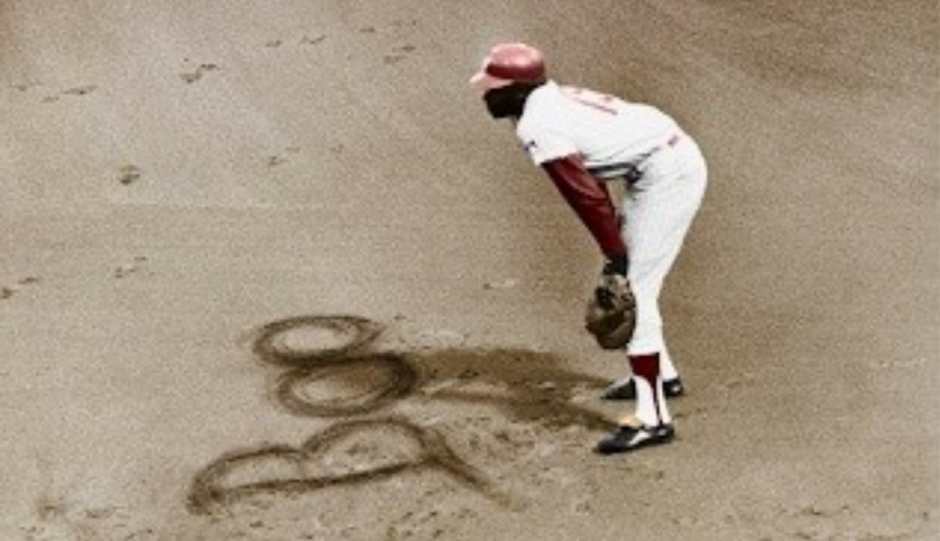The Philadelphia Phillies’ slugger’s death yesterday (okay, he also played for the Dodgers, Cardinals, White Sox, and Athletics) brought back a lot of memories from boyhood when Allen was this author’s favorite (and adored) athlete. Bruce Kuklick’s wonderful book on the stadium where Allen started his career, To Everything a Season: Shibe Park and Urban Philadelphia, 1909-1976, is particularly useful for putting Allen’s troubled career — not to mention Philadelphia’s racism — in perspective:
In Philadelphia in 1964, fans held a Richie Allen Night at the end of September. The National League later designated him Rookie of the Year. He batted .318 and hit twenty-nine homeruns. Allen drew fans to the stadium. Part of his appeal was his power. Everyone who went to Connie Mack Stadium in the sixties had a story about a shot fired off the right-center field scoreboard or, even better, an Allen home run, “those blasts,” said one fan, “disappearing – still on a rising trajectory – into steaming North Philadelphia summer nights.” one nonfan had been taken to the park once during the sixties and remembered only driving through “rundown slums . . . with worn out people out on their steps trying to beat the August heat” and “a home run by Richie Allen.” A fan who regularly went to opening nights reminisced about “Philadelphians booing Jim Tate [Democratic mayor] when he threw out the first ball, and “rockets by Richie Allen.” On at least three occasions he hit shots over the wall in dead center field, between 410 and 450 feet from home plate. Old-timers remembered that only Jimmie Foxx, a mythic figure by the 1960s, had equally crushed the ball. Allen was, one fan wrote, a “uniquely fearsome” batter. Twenty-five years later, Allen said, people would still recall to him their memories of home runs he hit over the Coke and Cadillac signs on the part’s left-center field roof. The sight of Number 15 digging in at the plate brought a surge of excitement to Philadelphia crowds, who stayed in the park until his last at bat, no matter what the score.
Some writers attributed the Phillies collapse after the 1964 riot [in August] to a dark unease that overtook Allen, the effect on him of the widespread tension and his emerging racial consciousness. A native of a small town that had a tiny black community, he claimed not to have known bigotry until he got into organized baseball. In fact, before Carpenter [Phillies’ owner] brought him up to the Phillies, Allen spent 1963 in the minors in Little Rock, Arkansas. There, where southern whites ridiculed him, he broke the sports color line. The essential thing, Allen said, was that “I came here black . . . [and] militant.” No crisis occurred, however, until the next year, 1965. That July Frank Thomas, an outfielder known as “the Big Donkey” because he said the wrong things to the wrong people, fought with Allen during batting practice. Thomas made racial slurs, Allen swung, and Thomas hit him with a bat. Five hours later the Phillies placed Thomas on waivers and ordered Allen not to discuss the incident, although it crystallized his own anger about his problems as a black baseball star. Many white fans responded negatively to Thomas’s dismissal. More and more of them delighted in jeering Allen. Some of the hostility was explicitly racial: “Nigger! Go back to South Street with the monkeys.” Allen certainly thought that “racial prejudice and segregation” caused his troubles with the patrons.
Yet matters were more complex. Carpenter later adamantly asserted that although Allen as “pro black” he was not “a militant.” And the extensive public record does not show that civil rights, the political protests of the 1960s, or social principle preoccupied Allen. Rather, he bought some racehorses and developed a love for the track, where he sometimes went, in expensive and exaggerated clothing, instead of to his job. By the late 1960s Allen was periodically and predictably late for games. He got into a celebrated barroom fight in 1967. Sometimes he came to the park drunk or did not come at all.
Allen became a star just before the unheroic side of ballplayers became common knowledge. Some of his antics did not differ from the activities of less notorious white players. Still, the need to hide his fears and insecurities drove Allen to destructive excess. I was labeled an outlaw,” he said, “and after a while that’s what I became.” (157, 159-160)
This wrinkle in my youth may be the source of some later irregularities in the pursuit of holiness and being human.




